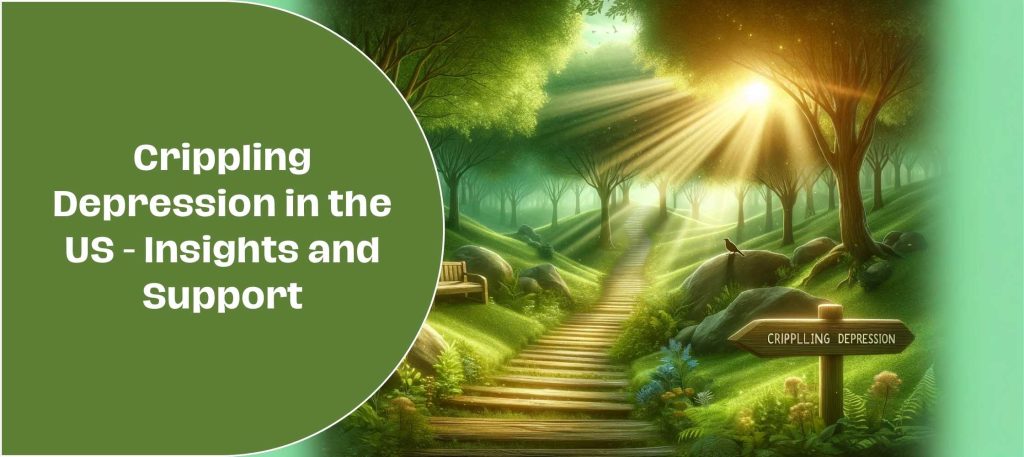|
Getting your Trinity Audio player ready...
|

Have you ever wondered just how many people around you might be silently battling a storm within? Let’s talk about crippling depression, a shadow that looms over many, often unseen and unheard. In this blog, we’ll delve into what this condition truly means, its prevalence, and how it affects lives across the United States. Join me on this journey of understanding, empathy, and hope.
The Scope of Crippling Depression in the U.S.
Imagine a room full of people; statistically, nearly three in ten of them have faced depression at some point in their lives. In the U.S., depression rates have surged to new highs. As of 2023, about 29% of American adults have been diagnosed with depression during their lifetime, a significant rise from past years. Even more concerning, approximately 17.8% are currently grappling with this condition. This increase isn’t just a number; it reflects millions of individual stories of struggle and resilience.
The Faces of Depression: Women and Young Adults Lead the Surge
Depression doesn’t discriminate, but it does impact some more than others. Women and young adults have seen the steepest rise in depression rates. More than one-third of women and nearly the same proportion of young adults aged 18 to 29 report having been diagnosed with depression. These groups are not just statistics; they are our friends, family, and colleagues, each dealing with their unique challenges.
Understanding the Symptoms
When we think of depression, we often picture someone feeling sad. But it’s so much more complex. Imagine waking up feeling like there’s a heavy blanket over you, not just physically, but emotionally and mentally.
There’s a profound fatigue, a loss of interest in things once loved, and a persistent cloud of hopelessness. For some, it’s like walking through life with a constant, unshakeable burden. These symptoms aren’t just feelings; they’re barriers that affect every aspect of life.
Causes and Risk Factors
Depression is like a puzzle, made up of various pieces that differ for each person. There’s no single cause; it’s a mix of genetic, environmental, and psychological factors. Imagine two people with similar life experiences but different reactions; one might develop depression while the other doesn’t. Why?
It’s a complex interplay of one’s biology, past traumas, current stressors, and even societal factors. In the U.S., these can range from economic pressures to cultural expectations, each adding a piece to the puzzle.
Treatment and Management
Imagine depression as a tangled forest. The paths to finding your way out – the treatments – are as varied as the trees. Some might find relief through medication, a scientific approach that recalibrates the brain’s chemistry. For others, therapy acts as a compass, guiding them through the emotional underbrush.
And then, there’s the power of lifestyle changes – like a diet rich in mood-boosting nutrients, regular exercise that dances away the blues, and mindfulness practices that calm the stormy mind. In the U.S., these treatments are becoming more accessible, but the journey is still a personal one, filled with trials and triumphs.
Personal Stories and Experiences
Let’s pause for a moment and listen to the echoes of those who’ve walked this path. Picture Sarah, a young professional who once saw the world in shades of gray. Through therapy, she rediscovered her palette of colors.
Or consider John, whose medication was the key that unlocked his potential, freeing him from the chains of crippling sadness. These stories are beacons of hope, shining light on the fact that while the journey is tough, the destination of a brighter, lighter life is within reach.
Supporting Someone with Crippling Depression
Supporting someone with depression isn’t about fixing them; it’s about holding space for them. Picture holding an umbrella over a friend in the rain. Your presence doesn’t stop the storm, but it offers shelter and warmth.
Simple acts of kindness, listening without judgment, and offering gentle encouragement can be the lifelines that someone needs. Remember, it’s not about grand gestures; it’s the small acts of understanding and patience that truly count.
Conclusion and Resources
As we wrap up our journey through the landscape of crippling depression, remember that this condition is as complex as it is challenging. Whether you’re battling it yourself or supporting someone who is, know that you’re not alone. There are resources – hotlines, websites, and community groups – ready to offer help.
As we part ways, carry with you the understanding that depression, though daunting, can be navigated and overcome. Let’s continue to foster conversations, break stigmas, and build a world where mental health is a journey we walk together.
Now, I invite you to join in this crucial conversation. Share this blog to spread awareness. If you or someone you know is struggling, reach out for help. And if you want to stay engaged with more content on mental health, consider subscribing. Together, we can make a difference.
- Unlocking Els Pet: A Comprehensive Guide For New Purchasers - August 9, 2024
- Laser Hair Removal Costs in the US – Complete Guide - April 13, 2024
- Quinoa for Weight Loss – Effective Tips & Healthy Recipes - April 1, 2024
